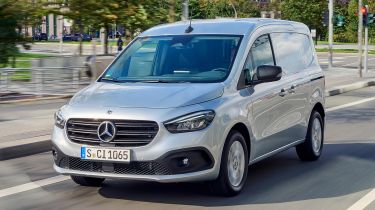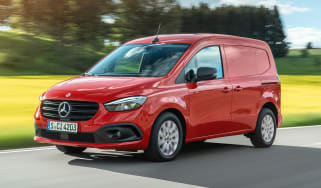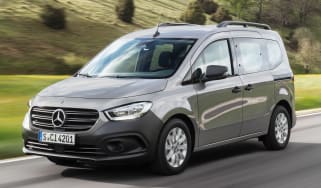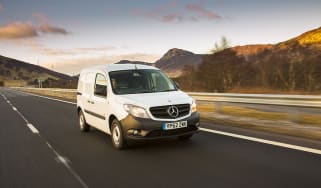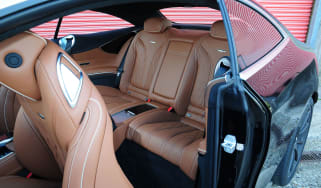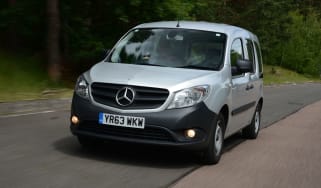Mercedes Citan van review
The Mercedes Citan is a solid all rounder, available with diesel or electric power
Our opinion on the Mercedes Citan
Mercedes’ smallest commercial offering comes with plenty of kit as standard, including the three-pointed star’s excellent MBUX infotainment system. It’s a decent all-rounder and the electric eCitan could be a good choice for some. Elsewhere, there are only two diesel engine options so the range isn’t all that wide.
About the Mercedes Citan
The Mercedes Citan probably isn’t the first model that comes to mind when thinking about small vans. Even within Mercedes’ own commercial line-up, the Citan can be overshadowed by the giant Sprinter and mid-sized Vito. But the Mercedes Citan is a decent seller in Europe, and the second-generation model features tech from Mercedes' passenger cars.
Of course it has to contend with all the usual suspects in the compact van class, namely the Vauxhall Combo, Citroen Berlingo, Peugeot Partner, Toyota Proace City and Fiat Doblo, which all share the same running gear. There’s also the Volkswagen Caddy to consider, which will share its underpinnings with the next Ford Transit Connect. And finally, you have the second-generation Renault Kangoo and Nissan Townstar.
The Citan’s styling is more of an evolution than a radical redesign of the old model. There's a mix of B-Class and Sprinter about it, with LED daytime running lights and a large grille with a big three-pointed star in the centre. The traditional two-box design is largely the same as before, and as with the previous generation, the Citan shares its bodyshell and running gear with the Kangoo.
Used - available now

2022 BMW
3 Series
78,000 milesAutomaticPetrol2.0L
Cash £17,000
2018 Mercedes
A-Class
67,000 milesManualPetrol1.6L
Cash £9,650
2018 Mercedes
A-Class
50,000 milesManualPetrol1.6L
Cash £11,850
2013 Renault
Clio
56,815 milesManualDiesel1.5L
Cash £5,995The Mercedes sits on the same platform as the Nissan Townstar too. But while this is the first time the Citan is being offered with an all-electric powertrain – badged as the eCitan – this is Mercedes’ last combustion-engined van.
There’s no petrol option like in its French and Japanese sister vans, just a 1.5-litre four-cylinder diesel engine that produces 94bhp or 115bhp depending on which version you pick. It comes as standard with a six-speed manual gearbox, but an optional seven-speed dual-clutch automatic is available. Meanwhile the all-electric eCitan is powered by a 121bhp electric motor and 45kWh usable battery.
Buyers are also given a simple choice of Base, Pro, Select and Crew specifications. All models get a full-width bulkhead, a single sliding side door to access the load area, rear doors capable of opening up to 180 degrees, a 9.5-inch touchscreen running Mercedes’ MBUX infotainment system, Apple CarPlay and Android Auto smartphone connectivity, a reversing camera, rear parking sensors, air-conditioning and heated side mirrors.
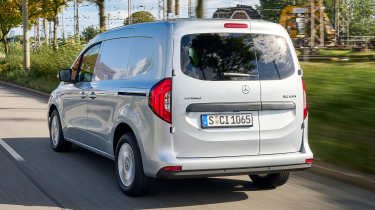
Upgrading to Pro gets you LED interior lighting, 16-inch alloys, Blind Spot Assist tech and plastic flooring in the load area. Select brings body-coloured bumpers, 16-inch 10-spoke alloy wheels, LED headlights, chrome interior trim, keyless go and high-beam assist. The Crew model is equivalent to the Base trim level but comes with a rear bench seat and provisions for carrying more passengers.
Because so many of today’s vans use the same underpinnings, like those from the Stellantis group and Toyota that we mentioned earlier, buyer’s shortlists are essentially the same vehicle from different brands. So the final decision may come down to matters of price, equipment and the quality or location of your local dealer.
The Mercede Citan starts from just over £21,500 (excluding VAT) in diesel form, which is not too bad considering the amount of kit you get as standard compared with the Kangoo and Townstar. Meanwhile, the eCitan starts from over £33,000 (excluding VAT and before the UK government’s plug-in van grant is deducted). Most small electric vans attract similar price increases over their combustion-engined counterparts, and will make many operators hesitant to switch to electric. But if you need a van to run in urban locations (especially those with low-emissions zones) an electric van like the eCitan could be quite cost effective over the long term.
MPG and running costs
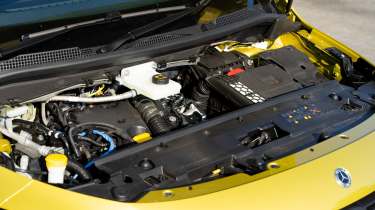
Pros |
Cons |
|
|
You have a simple choice when ordering a Mercedes Citan: old-fashioned diesel or modern all-electric power.
Mercedes says the 1.5-litre four-cylinder engine can achieve up to 55.4mpg on the WLTP combined cycle and emits 134g/km of CO2. Those figures are for the entry-level L1 model like the version we tested. However, after travelling more than 100 miles in the Citan we averaged 40.9mpg; enough to cover over 520 miles on a full tank. The L2 and Crew models have reduced official numbers (up to about 150g/km and 50mpg) due to higher weight and in the Crew van’s case, a slightly more powerful engine (114bhp).
The eCitan features a 45kWh lithium-ion battery and offers a WLTP combined range of up to 176 miles – five miles more than the Vauxhall Combo Electric and Citroen e-Berlingo van. Admittedly, while its rivals can charge at up to 100kW, the eCitan maxes out at 80kW, meaning a zero to 80 per cent top-up from a DC rapid charger will take 35 minutes versus 30 minutes in the Vauxhall or Citroen.
Fully recharging the electric Citan using an 11kW wallbox should take around four and a half hours, however, 22kW AC charging capability is available as an optional extra and cuts the time needed to fully replenish the battery down to two and a half hours.
Load space and practicality
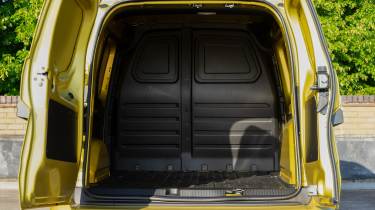
Pros |
Cons |
|
|
Whether you choose diesel or electric power for your Mercedes Citan, there’s no difference in the size of the load area. The L1 model can carry 2.9 cubic metres of cargo, while the L2 will squeeze 3.62 cubic metres inside. The maximum load length for the L1 is 1,806mm, while it’s 2,170 for the longer L2 version. The Crew version has 1,390mm behind the seats.
The Citan comes with a single sliding side door as standard and two rear doors capable of opening up to 180 degrees. An additional nearside sliding door is available as an optional extra though. It might not look like it, but the Citan can take a pair of Europallets, with the cargo area also featuring six tie-down points on the floor, and another four on the sides.
The Citan L1 has a maximum payload capability of 667kg, which is significantly less than the 850kg or 840kg you can carry in the ICE versions of the Kangoo and Townstar respectively. The Crew van in L2 form can carry up to 789kg, though. An enhanced payload (with stronger suspension) is available on the options list. Meanwhile the diesel Citan is rated to tow trailers up to a maximum gross train weight of 3,500kg.
All models get a plastic bulkhead separating the cabin from the load area. The bulkhead itself is curved, which allows for a more comfortable driving position, but does eat into the load bay. There’s no load-through option either to poke longer items through into the cabin, because the clever hinged bulkhead isn’t being made available in right-hand drive models.
Reliability, safety and security
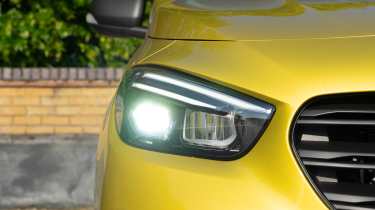
Pros |
Cons |
|
|
Unlike some other small vans, including the closely related Kangoo and Townstar, the entry-level Citan does come with a decent amount of safety kit. Every Citan features six airbags, Active Brake Assist, an Attention Assist system to detect driver fatigue, cruise control, speed limiter, seat belt warnings for the driver and passenger, rear parking sensors and a reversing camera, which offers a very clear view behind. However, it’s worth noting that the Citan’s alarm isn’t approved by Thatcham.
Top-spec models come with Blind Spot Assist and hands-free parking with the Active Parking Assist system. Unfortunately, the Citan misses out on the 360-degree camera system, intelligent cruise control and digital rear-view mirror available in the Kangoo and Townstar.
The Citan is covered by a three-year/unlimited-mileage warranty, while Mercedes offers warranty extensions at extra cost and numerous service plans too, including a pay-as-you-go package. Mercedes says the diesel Citan needs to be serviced after 18,000 miles or every two years, whichever comes first. The electric model should be very reliable, as with most EVs, because there are fewer moving parts to go wrong compared with ICE versions.
Driving and performance
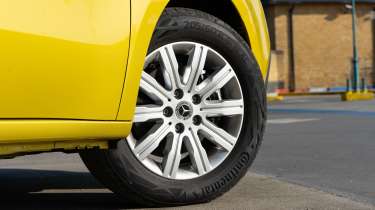
Pros |
Cons |
|
|
The Citan 1.5-litre diesel engine produces 94bhp and 260Nm of torque in panel van form, while opting for the Crew van unlocks 115bhp and 270Nm – all of which is sent to the front wheels. Mated to the standard six-speed manual gearbox the entry Citan will go from 0-62mph in 11.7 seconds and go on to a top speed of 109mph. The eCitan produces 121bhp and 245Nm of torque from its front-mounted electric motor.
We found the gear selector to be particularly annoying during our time with the auto diesel Citan, as we often found ourselves skipping past reverse and entering park. It demanded a delicate touch, otherwise what should have been quick manoeuvres were slow and quite frustrating.
The seven-speed automatic transmission was particularly slow to change up at low speeds too, while the start-stop system in the Citan we drove proved to be very temperamental, often starting the engine up again even while in park. Once on the move, however, the diesel engine provided plenty of oomph for most situations, and we never felt we were struggling to keep up with traffic.
At least the seats are supportive and soft enough, and with reach and rake adjustment on the steering column, finding a comfortable driving position for anyone around six-feet tall is a cinch, as we found out first hand. That’s with the driver’s seat at the very back of it’s available travel though, so very tall drivers could find the space a little more cramped.
Town driving, visibility and parking
The Citan doesn’t have the lightest steering we’ve ever experienced, but enough to make manoeuvring in tight car parks and town easy enough, with the 11.2-metre turning circle also helping in that department.
Motorway driving and long-distance comfort
We’ve only driven the diesel-powered Citan so far, but found it rides pretty well for a small van. It's well isolated from big thumps, while refinement is good, with low wind and road noise keeping the cabin relaxed. Despite the plastic bulkhead dividing the cab and the cargo area, we didn’t find much noise resonating through as we’ve experienced in some rival vans.
Cab interior and technology
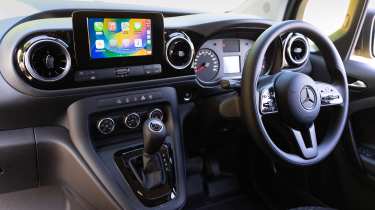
Pros |
Cons |
|
|
The cabin of the second-generation Citan has been infused with an essence of Mercedes’ passenger cars. Elements like the round air vents and three-spoke steering wheel look familiar, but of course the Citan uses tough plastics to give the cabin a more robust quality. We like the metallic-ringed dials for the heating and ventilation system, and the large shortcut buttons under the dashboard.
Van drivers need plenty of cubbies to store items and avoid cluttering up the cab, and there's no shortage of those in the Citan. Below the gearlever is a tray with USB ports for keeping your phone topped up and out of your line of sight to avoid any temptation from incoming notifications. The glovebox is a decent size, as are the door bins and cup holders. The top of the dashboard also dips slightly, creating what we think is an ideal space to plonk a clipboard or folder so it’s easy to grab when you need it.
There’s another storage bin under the armrest which is nice and deep, but annoyingly the armrest doesn’t support itself and is quite heavy, so you have to awkwardly keep it up, lest it lands on your wrist. You also have an enormous storage tray above your head, although this is probably best reserved for larger items.
Infotainment, sat-nav and stereo
In the centre of the dashboard you have a sharp, seven-inch touchscreen running the firm’s slick, intuitive MBUX infotainment system. The set-up was quick to respond to our inputs, and it comes with Apple CarPlay and Android Auto as standard which fills the entire display. The steering wheel features a mixture of touch-sensitive controls, like those in the A-Class hatchback for example. These are used for swiping through the infotainment system and small display behind the steering wheel, while you get physical buttons for the other key controls.
Buying and owning
The Mercedes Citan comes in L1 or L2 wheelbases, with panel van or Crew van layouts – the latter having extra windows and a bench seat for a second row of passengers, and only being available in its own trim level. The panel van is available in Base, Pro or Select trims, the only one with body-coloured bumpers being the top-spec Select version. However if you don’t mind the more downmarket exterior look, even the Base model has a good infotainment screen and all the safety kit you could want, so it’s actually not a bad option, even for non-fleet buyers.
Alternatives
Rivals include the Vauxhall Combo, Citroen Berlingo, Peugeot Partner, Toyota Proace City and Fiat Doblo (which are all the same van in different guises), as well as the Volkswagen Caddy and Ford Transit Connect. There are also the Renault Kangoo and Nissan Townstar, which the Citan shares many components with.
Van dimensions
| Body style | Height | Width | Length |
| L1 van | 1,838mm | 1,859mm | 4,498mm |
| L2 van | 1,852mm | 1,859mm | 4,922mm |
Load area dimensions
| Body style | Height | Width | Length | Volume |
| L1 van | 1,256mm | 1,524mm | 1,806mm | 2.9m3 |
| L2 van | 1,256mm | 1,524mm | 2,170mm | 3.62m3 |
| Crew van | 1,256mm | 1,524mm | 1,390mm | 3.25m3 |
Frequently Asked Questions
Provided the singular diesel engine option suits your needs, the Citan is a good van - it’s smooth and easy to drive, has a decent load bay and good equipment. However rivals offer more carrying capacity and better value for money.

